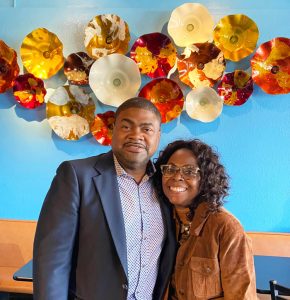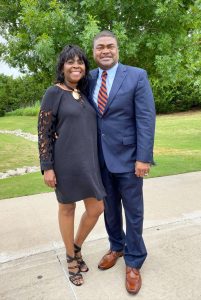
By Rev. Donald L. Perryman, Ph.D.
The Truth Contributor
My [prayer ritual] is spending time to ask for what I need and then listening for the answer…[Afterward] I feel grounded, guided, and supported all day. I feel like I’m co-creating my outcome with the universe.
– Lena West
African American churches and their clergy leaders have always led the attack in the battle for community transformation while also providing the “spiritual food” necessary for their congregants to sustain the fight.
Yet, record numbers of Black and evangelical pastors have walked away from the profession in the last decade, threatening the Black Church’s power and influence in the Black community. According to a recent survey from Lifeway Research, issues for leaving the profession include a “change in calling,” burnout, family issues, and personal finances.
Timothy L. and Felica Clark are co-pastors of Harvest Christian Center in Sylvania Township. Clark, a pastor for over 35 years, is also a financial ddvisor for New York Life. Co-Pastor/First Lady, Felica Clark is also the director of Diversity, Equity, and Inclusion for MetroParks Toledo, where she has worked since 2007.
I talked with the couple about the painful reality of clergy efforts to balance spiritual obligations with Church leadership and personal life demands.

Perryman: Research shows that ministry comes with many stressors that lead to burnout and emotional overload. Please tell me about your issues of stress associated with ministry.
Clark: Mine is more workload. I’m consistently working six days a week. It’s not a sustainable pace, but my goal is to take off 12-15 Sundays a year. I’ve accomplished that previously, but we had shifts in our ministry that didn’t allow me to do that this year. So hopefully, we can get back to a schedule that allows me time off.
Perryman: Lady Clark, do you want to weigh in?
First Lady: And I don’t know how to balance this, but I don’t think I necessarily recognized it as burnout until we hit COVID, and I still am. In our world, we both have jobs, and they’re demanding. On top of that, I just finished my MBA program, so it was a lot.
We started this ministry in 2005, and we may take a Sunday off, but we’ve never actually had a real sabbatical. And so, unlike my husband, I think I’m burned out now. But, of course, you love the people and try to keep everything going. But, still, I know that I need time to get away, retreat, rejuvenate to the point where ministry is exciting again.
Perryman: So, you never get a chance to unplug, to turn off the phone?
First Lady: We’ve never done that since 2005. Even when we’re on vacation and something happens, the people we serve know that we are accessible. They know that if they need us, we’re there, and because of that, yeah, I would love to get away. We’ve had families that needed everything. They required their rent paid, they needed spiritual encouragement, they needed mental support, they needed all types of support.
The other side of that is that we have so many people depending on us like our children and our parents are elderly now and we play a role there. And, of course, the ministry and all of the other things that we do.
Perryman: How do you handle the stress?
First Lady: I can’t even underscore this enough. We are radical about our prayer times. We know that we don’t have the luxury to not do that. I’m just coming out of my prayer time today. We are radical about prayer, and we don’t miss our times with God. We recognize that we couldn’t float this boat without it. We know it.
Perryman: Pastor, can you elaborate on taking time to spend time with God?
Clark: Typically, I’m up praying at 5:30 in the morning. The way I do it is an hour or more, which we do daily. I’m thanking God, going through the confession, going through petitions, supplication, praying in the spirit, we call it. So yeah, it’s a full-scale hour prayer because I know everything I’ve got to do, and the level that I believe God can take me is going to take me communicating with him. So that’s our practice.
Perryman: Is there anything you want to add, Lady Clark?
First Lady: I had a praying grandmother. I remember her sitting in her chair in the corner, just humming hymns and crying out to God, and I have a praying mother who still is responsible for covering us through prayer, and then Tim and I met at a prayer meeting, that’s how we met. We believe in God that we want to be the type of leaders, the type of examples, the type of people who bear fruit, and we are relentless about that. That’s what’s keeping our minds in all of this craziness.
Perryman: You also have a child that’s bipolar. So, that’s a lot. Do you have a specific self-care plan?
Clark: I don’t think we have a specific self-care plan outside of every 90 days we’re getting out of here. I have a membership at Massage Envy, so typically, I will be in the massage place. So, indirectly we have a self-care plan, but I think it’s always been part of my lifestyle.
First Lady: What I do is I walk, even in the colder weather. I have my long to-do list and what I do is chart out my day, and exercise is a part of it. I work for the Metroparks so that I could go into any of those parks. Still, Olander is literally right in our backyard, and sometimes I just walk around the lake for three miles. I also love yoga. I’ve started to do some really good breathing exercises, and I absolutely love yoga and all of the stretches, so that’s a lot of my self-care. And I enjoy cleaning my house. I have a degree in interior design from years ago, and I still do it. I still love a comfortable home that smells good. My husband will tell you we invest in good-smelling candles, and I believe in setting the atmosphere, so that’s all a part of self-care for me.

Perryman: Well, you have talked about making time to refresh your mind, nurture your bodies, and encourage your soul or spirit. Do you pay special attention to your marriage life?
Clark: I believe we do. There were some demands on our marriage by being a newer church. Still, every Friday night is date night, and obviously, our kids are older now. This year, it may have been a little more challenging with her MBA. We had less time together, so she canceled about 20 dates on me this year. We connect quite a bit when that’s not in the picture. What do you think, sweetheart?
First Lady: If I’m candid, our marriage was challenged when we entered the ministry in 2005. When I reflect on it, it wasn’t just the pressure of church, it was what our bodies were going through physically also, and I don’t think we recognized that. I was going through a period of menopause, and he was going through his change too.
He won’t admit it, but he was, and we were both going through the change of life during one of the most challenging periods of our life. We didn’t know that our son was sick. We didn’t know, that’s when the economy was the worst, and we had to find better-paying jobs. So, it was just a lot going on, on top of what was going on physically in our bodies.
Once we got a grasp on that, we’re in the best place in our marriage because we recognize that we have to intentionally care for one another and treat the other person like they are the most important person in our lives. I can’t speak for Tim, but that’s how I look at him.
We’ve been married 32 years, and that’s what I’ve learned from it. Tim’s the most important person in my life. When he comes in and talks about his day or his clients or how he feels, I want to stop what I’m doing and give him full attention and let him know that he is the most important person in my life and to react to that. Whatever he needs, I want to be sacrificial and be a perfect team player in this marriage. So, when you talk about care in our relationship, we’re probably at the best time. We’ve been prudes and everything else, but right now, at this stage, we’re probably at the best.
Perryman: Have you recognized symptoms of mental illness that your congregants might experience?
Clark: We know it. We got hooked up with the National Alliance on Mental Illness (NAMI), went through the 13-week class, and then speakers, so now we’ve been educated on recognizing those symptoms. We’ve done seminars and told our story all over. As a result of my son TJ’s bipolar sickness, congregants have told us, ‘Hey, I’ve got a cousin dealing with mental illness; or, I’m dealing with mental illness myself.’ So, that whole window has opened.
Perryman: Finally, what recommendations do you have for other leaders to keep their marriages fresh and address potential mental health issues in their congregations?
Clark: I would say pastors should prioritize getting away. If you can get people trained on your ministry team to minister or teach, you want to get away at least 12-15 weeks. Maybe for Black pastors, I would say at least six. Then, of course, on the mental health side, I refer many people to NAMI because they have support groups on Monday night for the parents and the teenagers. If it goes deeper, we know how to tell them to call Rescue or Zepf if it gets to the point of them harming themselves or others. If an issue arises when you need to call the police, always contact a Crisis Intervention Team/Officer (CIT), especially in our community.
First Lady: The other thing is I would recommend seeking out mentors. If you see others coming into the ministry or if you’re more senior to them, take the time. Go out for a cup of coffee and hear other people’s hearts, and pour back into other people in ministry. My husband and I both needed mentors. You need mothers and fathers in the ministry who genuinely love you and are willing to pour God into you and give you the correct instructions. So many of us don’t have that.
The bottom line is that pastors are just broken men and women that God is using. We’re all broken. We’re not going to always get it right, and we’re going to make mistakes. But, nevertheless, accountability is needed, and so many clergy leaders don’t have that, and that’s why we sometimes go astray.
So, I think just having mentors to keep us accountable is essential.
Perryman: Well, that is certainly time well spent. Thank you.
Contact Rev. Donald Perryman, PhD at drdlperryman@centerofhopebaptist.org
